9 Best Ecommerce Platforms to Choose for Your Business in 2025
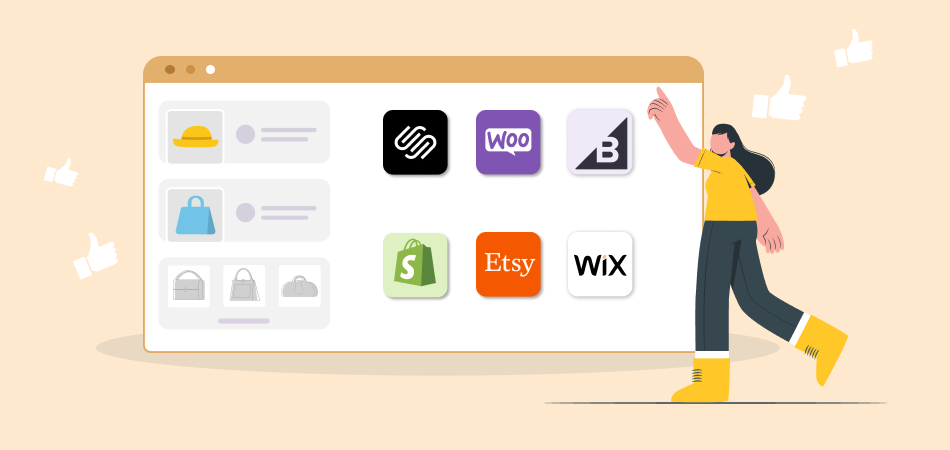
E-commerce has grown exponentially, making it crucial for businesses to choose the right platform to succeed in the competitive online marketplace. Whether you're a small business owner, a startup, or an established brand, selecting the best e-commerce platform can significantly impact your sales, user experience, and scalability.
This article explores the nine best e-commerce platforms available today, helping you determine the best fit for your business. Check the list:
What Is an E-commerce Platform
An e-commerce platform is a software tool that allows businesses to set up, manage, and run online stores.

|
Manage Multiple Stores In One Account Multiple Stores Management - Link and manage multiple stores on different platforms in one place |
These platforms provide essential tools for website design, product listings, payment processing, inventory management, marketing, and customer service.
E-commerce platforms come in different types, including:
- Hosted Platforms: Cloud-based solutions that manage hosting, security, and maintenance for businesses. Examples include Shopify and BigCommerce.
- Self-Hosted Platforms: Open-source software that allows full customization but requires technical expertise. Examples include WooCommerce and Magento.
- Enterprise Solutions: Advanced platforms designed for large-scale businesses with high traffic and complex requirements, such as Salesforce Commerce Cloud and Adobe Commerce.
9 Best E-commerce Platforms
With e-commerce continuing to grow, businesses need a reliable platform that offers flexibility, scalability, and powerful features. Here are the nine best e-commerce platforms to consider in 2025.
1. Shopify
Shopify is one of the most popular e-commerce platforms worldwide, known for its ease of use and extensive app ecosystem. It provides a fully hosted solution, allowing businesses to set up an online store quickly without worrying about technical aspects like hosting, security, and maintenance.
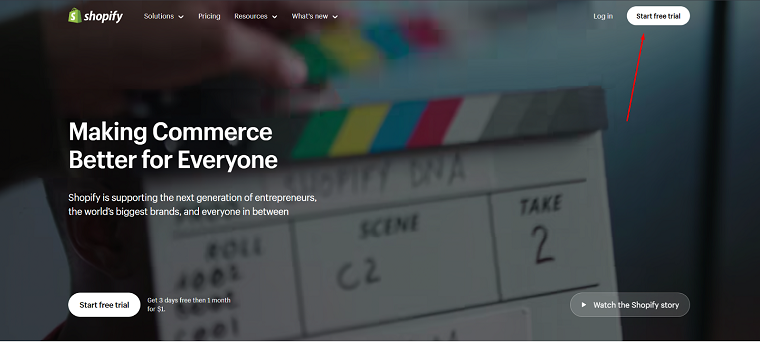
Shopify is ideal for small to medium-sized businesses, startups, and even large enterprises through its Shopify Plus plan.
Key Features:
- User-friendly interface: Build a store without any coding knowledge
- Multi-channel selling: Sell on Facebook, Instagram, TikTok, and Amazon
- Shopify Payments: Integrated payment gateway with no extra transaction fees
- AI-powered marketing tools: Automate campaigns and product recommendations
- Extensive app store: Thousands of integrations for enhanced functionality
- Easy to set up and manage
- Reliable and secure hosting included
- Large community and customer support
- High-quality themes and design options
- Scales well with business growth
- Monthly fees can be expensive for small businesses
- Limited customization without coding or additional apps
- Additional transaction fees with alternative payment gateways without Shopify Payments
2. WooCommerce
WooCommerce is an open-source e-commerce plugin for WordPress, allowing users to convert their website into a fully functional online store.
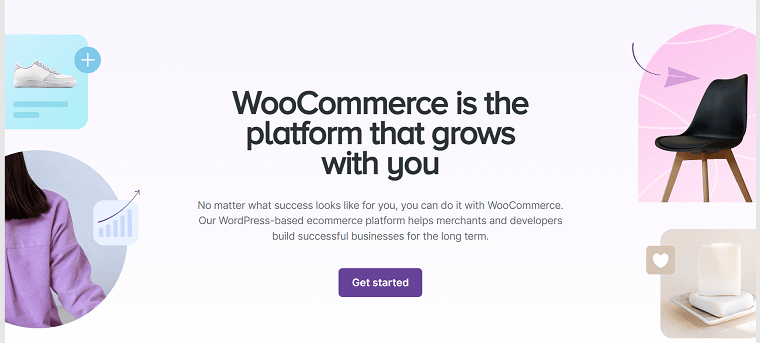
Unlike Shopify, WooCommerce is self-hosted, meaning you’ll need your web hosting, but this also allows for greater customization and flexibility. It’s ideal for businesses already using WordPress or those wanting complete control over their store.
Key Features:
- Completely customizable: Full access to code and WordPress plugins
- No monthly fees: Free to use, aside from hosting and optional extensions
- SEO-friendly: Leverages WordPress’s strong SEO capabilities
- Flexible payment gateways: Supports PayPal, Stripe, and many others
- Large developer community: Easy to find support and resources
- No platform transaction fees
- Highly customizable with thousands of plugins
- Strong SEO and blogging capabilities
- Scalable for businesses of all sizes
Check here for WooCommerce Pricing.
- Requires hosting and domain setup separately
- Can be complex for non-technical users
- Additional plugins may increase costs
3. Wix
Wix is a website builder that offers e-commerce functionality, making it a great choice for small businesses, creatives, and startups. It provides an intuitive drag-and-drop interface, eliminating the need for coding knowledge.
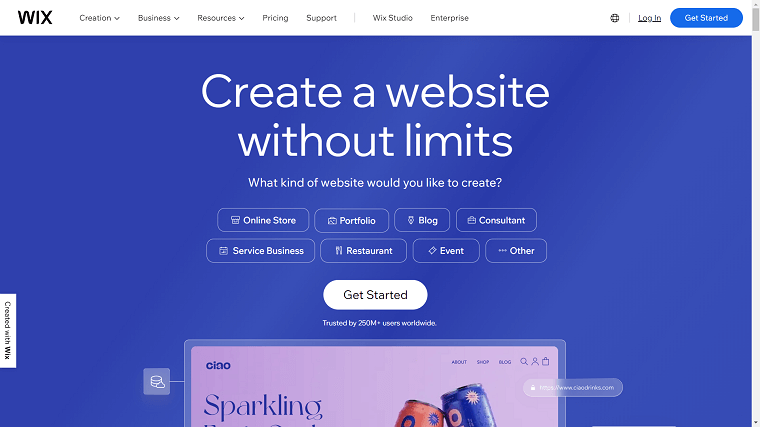
While not as powerful as Shopify or WooCommerce, Wix is ideal for those who want a visually appealing and easy-to-manage online store. Could you get a Wix store for free? Check the article here.
Key Features:
- Drag-and-drop builder, no coding skills required
- Mobile-optimized designs with a seamless shopping experience
- Marketing tools included Email marketing, SEO, and social media integrations
- Built-in payment gateways like PayPal, Stripe, and Wix Payments
- Affordable pricing plans, good for small businesses on a budget
- Extremely easy to use and set up
- Visually stunning templates and design flexibility
- No need for third-party hosting
- Built-in SEO and marketing tools
- Less scalable for larger businesses
- Limited advanced e-commerce features compared to Shopify or BigCommerce
- Migration to other platforms can be difficult
4. Squarespace
Squarespace is a website builder known for its elegant design templates, making it ideal for artists, photographers, and small businesses that prioritize aesthetics.
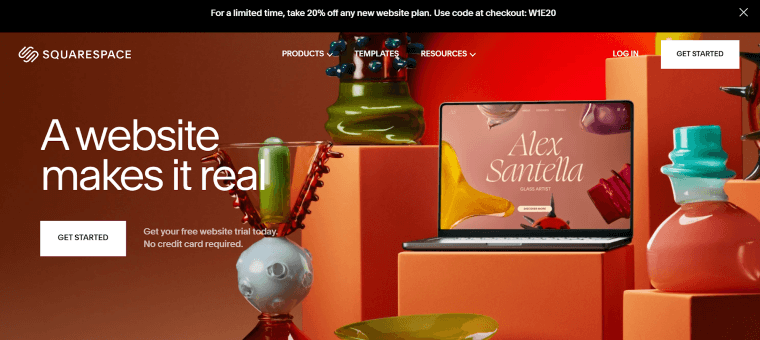
While not as feature-rich as Shopify, it offers solid e-commerce capabilities, including integrated payment processing, inventory management, and marketing tools.
Key Features:
- Professionally designed template: Best for visually driven brands
- Integrated payment processing: Supports Stripe and PayPal
- Built-in blogging and content marketing tools: Great for brand storytelling
- SEO and analytics tools: Helps with visibility and tracking performance
- Mobile-optimized shopping experience: Ensures responsiveness
- Beautiful and modern design templates
- All-in-one hosting and security included
- Great blogging and content marketing features
- Simple and intuitive user experience
- Limited third-party integrations compared to Shopify
- Fewer advanced e-commerce features
- Less flexibility for scaling large businesses
5. Ecwid
Ecwid is a cloud-based e-commerce solution designed for businesses that want to integrate an online store into an existing website, social media page, or marketplace.
Unlike traditional platforms, it doesn’t require users to create a new website. Now, this platform integrates with DSers to simplify the dropshipping process.

|
Adapt Your Product Prices Automatically DSers Automatic Pricing - Pre-set Pricing Rule to mark-up your product price automatically |
Key Features:
- Seamless website integration: Works with WordPress, Wix, and Weebly
- Free plan available: Good for small businesses starting out
- Multi-platform synchronization: Manage inventory across multiple channels
- Mobile-friendly design: Optimized for mobile shoppers
- Quick setup: No coding skills required
- No need to build a new website
- Easy integration with existing platforms
- Free plan available for small stores
- Good for selling on social media
- Limited customization options
- Not as feature-rich as Shopify or BigCommerce
- Scalability is limited for large stores
6. BigCommerce
BigCommerce is a powerful e-commerce platform designed for growing businesses and enterprises. It offers built-in SEO tools, multi-channel selling capabilities, and an API-driven infrastructure for customization.
Key Features:
- No transaction fees: Unlike Shopify, there are no additional charges
- Multi-channel selling: Amazon, eBay, and Google Shopping integration
- B2B e-commerce features: Ideal for wholesale businesses
- Advanced SEO tools: Helps improve organic traffic
- Scalable and secure infrastructure: Ideal for high-traffic stores
- No transaction fees on any plan
- Strong built-in features (no need for extra apps)
- Scalable for larger businesses
- Advanced SEO and marketing tools
- Higher pricing compared to Shopify
- Steeper learning curve for beginners
- Limited free themes available
7. Big Cartel
Big Cartel is an e-commerce platform specifically designed for independent artists, makers, and small businesses. Unlike Shopify or BigCommerce, which cater to larger-scale e-commerce operations, Big Cartel focuses on simplicity, affordability, and ease of use.

|
Tracking Number with Auto Sync Auto Sync Tracking Numbers - Automatically sync the tracking number from AliExpress to your store |
It’s a great option for those who want to sell handmade goods, artwork, or niche products without dealing with complex e-commerce setups.
Key Features:
- Simple and quick store setup: No coding skills are required
- Free plan available: Ideal for small stores with a few products
- Customizable themes: Allows for basic branding and personalization
- Direct-to-consumer model: No marketplace commissions
- Mobile-friendly store builder: Manage your store on the go
- Affordable, with a free plan for small sellers
- Very easy to use, even for beginners
- No hidden fees or high transaction costs
- Ideal for artists and creatives who don’t need advanced features
- Limited customization and scalability
- Basic features compared to Shopify or BigCommerce
- No built-in multi-channel selling options
8. Adobe Commerce (Magento)
Formerly known as Magento, Adobe Commerce is an enterprise-level e-commerce solution built for businesses that require high customization, scalability, and advanced functionality.
Unlike hosted platforms like Shopify, Adobe Commerce is open-source, meaning you’ll need technical expertise to set up and manage your store. It’s best suited for large businesses or enterprises with dedicated development resources.
Key Features:
- Fully customizable: Open-source platform with complete control over design and functionality
- AI-powered personalization: Advanced customer targeting and recommendations
- Omnichannel commerce: Sell across multiple platforms seamlessly
- Scalable infrastructure: Ideal for high-traffic stores and enterprises
- Advanced security features: PCI compliance, fraud protection, and secure payments
- Highly flexible and customizable for large businesses
- Powerful integrations with ERP and CRM systems
- Scalable for high-traffic and complex e-commerce needs
- Strong SEO and performance optimization tools
- Requires technical expertise or developer support
- High setup and maintenance costs
- Not ideal for small businesses or beginners
9. Etsy
Etsy is a popular online marketplace known for handmade goods, vintage items, and craft supplies. Unlike traditional e-commerce platforms like Shopify, Etsy allows creators and small businesses to sell their products to a massive global audience without needing to set up their own website.
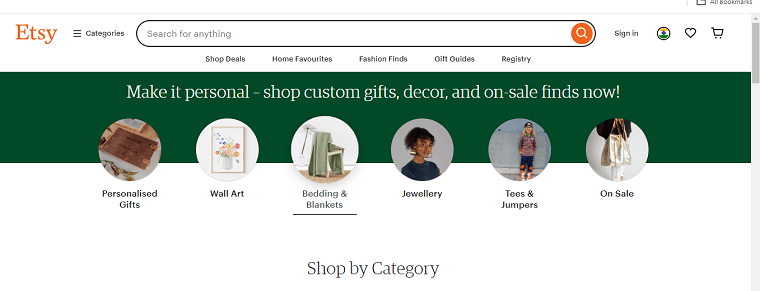
It's especially ideal for sellers in niche markets looking to connect with customers who appreciate unique, personalized, and artistic products.
Key Features:
- Niche-driven audience: Ideal for handmade, vintage, and creative goods
- Built-in marketplace traffic: Access millions of shoppers worldwide
- Easy shop setup: No need for complex store building or hosting
- Promoted listings: Tools for advertising within the Etsy platform
- Secure transactions: Etsy handles payments and offers buyer/seller protection
- No need to build or host your own website
- Great for creative entrepreneurs and niche sellers
- Easy product listing and streamlined selling process
- Transaction, listing, and payment processing fees can add up
- Limited customization and branding control compared to your own site
How to Choose the Best E-commerce Platforms
Selecting the right e-commerce platform is essential for the success of your online business. Below are the key aspects you should evaluate when choosing the best platform for your business.
1. Business Size and Growth Potential
The size of your business and your growth ambitions play a crucial role in determining the right e-commerce platform.
If you are a small business or startup, platforms like Shopify, Wix, and Big Cartel are excellent choices due to their user-friendly interfaces and affordable pricing. These platforms allow businesses to set up quickly without technical expertise.
2. Ease of Use vs. Customization
Ease of use is a critical factor, especially for those without coding knowledge.
Platforms like Shopify, Wix, and Squarespace provide drag-and-drop store builders, pre-designed themes, and intuitive dashboards, making them ideal for beginners and small businesses that want a quick and hassle-free setup.
3. Pricing and Budget
Your budget will significantly impact your choice of an e-commerce platform. Some platforms, such as WooCommerce (self-hosted) and Big Cartel, offer free plans, making them excellent choices for businesses on a tight budget.
However, you will need to pay for web hosting, domain registration, and premium extensions for added functionality.
4. Payment Processing & Transaction Fees
The ability to accept payments seamlessly is vital for any online store. Many platforms, including Shopify, BigCommerce, and WooCommerce, support multiple payment gateways like PayPal, Stripe, and Apple Pay.
5. Multi-Channel Selling
If you want to expand your sales channels beyond your website, multi-channel selling is a crucial factor. Platforms like Shopify, BigCommerce, and Ecwid allow businesses to integrate their stores with marketplaces like Amazon, eBay, and Facebook, as well as social media platforms like Instagram and TikTok.

|
Manage Multiple Stores In One Account Multiple Stores Management - Link and manage multiple stores on different platforms in one place |
Conclusion
Selecting the appropriate e-commerce platform is crucial for the success of your online business. Whether you need a simple, user-friendly solution like Shopify or Wix or a highly customizable platform like Magento or OpenCart, there’s an option for every business type.
Consider your budget, technical expertise, scalability needs, and desired features to make the best choice in 2025.









 Company
Company
 Why Choose DSers
Why Choose DSers
 Blog
Blog
 Help Center
Help Center




 Live Chat
Live Chat